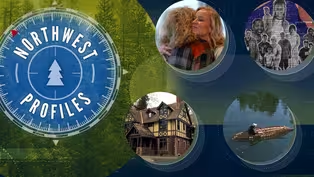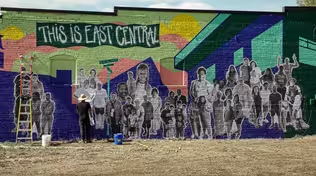Northwest Profiles
Uncommon Joy: The Story of Cancer Can't
Clip: Season 37 Episode 3704 | 6m 31sVideo has Closed Captions
Hear an incredible story of heart from the founder of Cancer Can’t, Becky Van Keulen.
Hear an incredible story of heart from the founder of Cancer Can’t, a Spokane based non-profit. Learn about the different services provided by Cancer Can’t and why they are so important for the Spokane community.
Problems playing video? | Closed Captioning Feedback
Problems playing video? | Closed Captioning Feedback
Northwest Profiles is a local public television program presented by KSPS PBS
Funding for Northwest Profiles is provided by Idaho Central Credit Union, with additional funding from the Friends of KSPS.
Northwest Profiles
Uncommon Joy: The Story of Cancer Can't
Clip: Season 37 Episode 3704 | 6m 31sVideo has Closed Captions
Hear an incredible story of heart from the founder of Cancer Can’t, a Spokane based non-profit. Learn about the different services provided by Cancer Can’t and why they are so important for the Spokane community.
Problems playing video? | Closed Captioning Feedback
How to Watch Northwest Profiles
Northwest Profiles is available to stream on pbs.org and the free PBS App, available on iPhone, Apple TV, Android TV, Android smartphones, Amazon Fire TV, Amazon Fire Tablet, Roku, Samsung Smart TV, and Vizio.
Providing Support for PBS.org
Learn Moreabout PBS online sponsorshipMy name is Becky Van Keulen and I am the co-founder of Cancer Cant.
Cancer Cant is a local nonprofit that its mission is to serve adult oncology patients in the inland northwest.
My late husband, Jonathan, was diagnosed with cancer when he was 29.
He was not able to work while he was going through treatment.
So he started Cancer Can't.
And we basically did that together from a hospital room.
He did it to help the people that came after us and give some sort of purpose to what we were going through.
So now that's what I've continued to do.
Since he's passed.
I continue to run Cancer Cant with a wonderful board and people all throughout the community.
Hey, do you have a second?
I am reviewing the grant application that you sent over some of these numbers.
I'm just like, well, where are we pulling them from?
And just making sure that we're verifying with them where they're getting their numbers from.
When we started Cancer Cant, Jonathan was doing treatment at Sacred Heart here in Spokane.
We lived in the hospital like it was like five days in the hospital, a couple days out.
We had two little kids at the time and there were not a lot of amenities.
We worked with Providence to remodel seven South, which was the entire oncology floor.
Getting refrigerators in those rooms.
We purchased recliner chairs for a support person that could stay.
Started out with the hospital being the focus, and then from there, it's just taken on a life of its own.
Oftentimes, patients, when going through chemotherapy aren't able to drive and further, it's not safe to take public transportation when you're immunocompromised.
So your option is to have somebody else drive you.
So we have volunteer drivers.
We're averaging somewhere between like 300 rides a month to upwards of 500 rides a month, getting patients to treatment.
We have a grant program so patients that are in emergent need, you know, you just got a diagnosis.
You weren't planning on losing an income.
All of a sudden you have max out of pocket for insurance.
Mostly this program is paying for things like rent, car insurance, groceries, babysitting.
It's just the basic things that people need day to day.
And we also do a program called Cancer Can't Take Christmas, where we partner sponsor families with cancer, families that have kids.
That's really a fun program where we just get to bless families during holidays.
We also have a lodging program.
So now when patients are traveling from rural communities to Spokane for treatment, we put them in hotel rooms and have a place for them to stay.
Adult cancer patients are kind of looked over group, I think.
Primarily cancer diagnosis has happened later in life.
Not only are baby boomers getting older, but then we also decreased our preventative scanning because of the pandemic.
And so cancer is really going to be something that is going to impact our communities, our families.
And we need to be making sure that there are resources for these people.
Cancer has completely changed my life.
We were pretty young when my husband was diagnosed.
We were 29.
We were living the American dream.
Two little kids, he was making enough money.
I could be a stay at home mom.
Now my whole world is essentially giving back.
So I do this on a complete volunteer basis at sometimes full-time hours.
Not to mention what it's like to raise kids without their dad.
You're constantly dealing with grief.
I've delivered Christmas presents to a family, and the only person that was there was the dad.
And all of a sudden the kids were going to show up with all these gifts.
But he knew my story.
He said, Can I ask you a question?
How do I tell my kids that their mom's going to die?
I just remember having that same question.
You don't have anyone to ask that question.
I live it every day, and sometimes it's not easy, but sometimes it is also very gratifying that, you know, you get a text message or something from someone that you drove that you know, I don't know what I would do without you guys.
I probably wouldn't be here, actually.
So there's highs and lows.
If we didn't have organizations like Cancer Cant, survival rates would be less.
If you don't have the ability to have a resource to get to treatment or you can't pay for something, whether it's financial, whether it's transportation.
There are often situations where people are choosing to just not have treatment at all because they can't overcome the barriers to access care.
I viewed cancer count as kind of a little bit of like a pay it forward movement, whether it's, you know, sponsoring a family at Christmas or shopping and delivering gifts or driving people to treatment.
It's just a collaborative group of people wrapping their arms around each other.
I think moving forward in the midst of something awful is looking outside yourself and doing something for someone else, and you might discover something and that's what I've kind of discovered is uncommon joy.
Video has Closed Captions
Preview: S37 Ep3704 | 30s | Cancer Can't founder Becky Van Keulen, East Central mural, Campbell House, Salishan Canoe. (30s)
Video has Closed Captions
Clip: S37 Ep3704 | 7m 6s | Terrain and the East Central neighborhood designed a mural that reflects the community. (7m 6s)
Providing Support for PBS.org
Learn Moreabout PBS online sponsorshipSupport for PBS provided by:
Northwest Profiles is a local public television program presented by KSPS PBS
Funding for Northwest Profiles is provided by Idaho Central Credit Union, with additional funding from the Friends of KSPS.
















